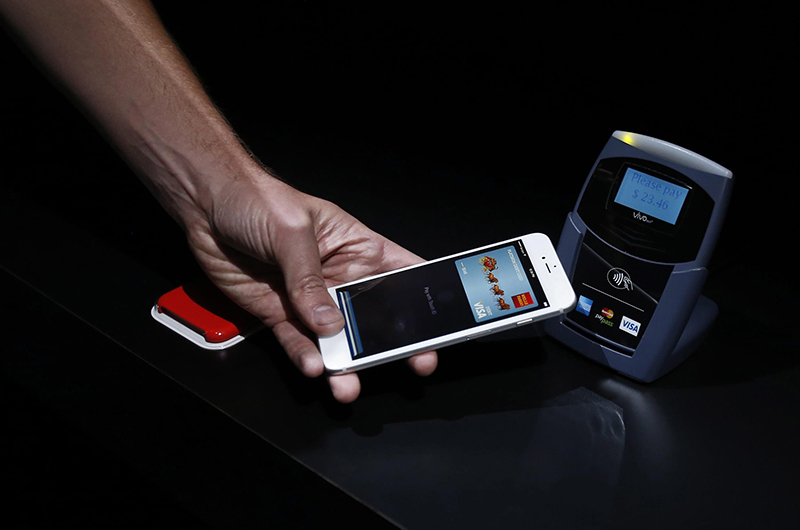
When Apple announced this fall that the new iPhone 6 and 6 Plus would have built-in "contactless" payment technology for smartphone users, the news sparked a major resurgence of interest in NFC (Near Field Communication) which powers this kind of transaction.
NFC has been around for nearly fifteen years, but its use for payments has been hampered by several factors, including the reluctance of merchants to purchase devices that can process a wireless signal. With Apple Pay, customers can now simply wave their smartphone near a payment terminal and the transaction is completed almost instantly.
According to experts closely associated with companies who operate in the NFC space, Apple Pay could well be a huge game changer in speeding the adoption and greater use of this technology in our daily lives. "Nothing but positive things will occur within the mobile payments space due to the launch of Apple Pay," says Scott Haug, a partner at the Waterstone Management Group. "It represents an exciting inflection point in the payments ecosystem."
Apple's timing in releasing NFC-enabled phones now is closely linked to another major shift taking place in the payments world: the emergence of the chip card. The highly publicized thefts of personal data from Target and Home Depot have pushed big retailers to install new POS (point-of-sale) terminals that can accept more secure credit or debit cards with embedded chips. Many of these new terminals will have NFC capability as well.
"It seems reasonable that the credit card issuers and banks would also encourage the inclusion of NFC reader functionality in these POS systems," says Curt Schmidek, vice president of marketing for LitePoint, a company that specializes in advanced wireless testing solutions.
Schmidek says that his company is already seeing increased interest in its IQnfc system for NFC testing. According to Schmidek, "It appears that other device manufacturers are betting that Apple will find the right recipe and drive new life into NFC-enabled payment technology."
If the need for security is driving greater installation of chip card-reading terminals, then NFC-equipped devices such as the iPhone 6 could strengthen customer data protection as well. Recent analysis by Juniper Research points out that because Apple Pay uses secure tokens for transactions, retailers will not be able to store bank card, email or password information.
"The tokenization process that underpins Apple Pay is seen as one of the most secure and fraud-proof payment mechanisms available," says Waterstone's Haug.
Despite the security advantages and built-in technology for the next generation of terminals, NFC and Apple Pay still face significant obstacles. Haug points out that merchants have been slow to embrace NFC-enabled payments (there are over 9 million merchant locations in the U.S. and Apple Pay will initially be accepted at only 220,000 of them).
There have also been issues over the past couple of weeks with the rollout of Apple Pay itself. Over 1,000 debit transactions using the payment system were inadvertently duplicated for Bank of America last month. The error was attributed to a processing glitch between the bank and one payment network.
Apple also has increased competition for its new service. A coalition of retailers that includes Walmart, Best Buy and Gap Inc. are working to build a mobile wallet app called CurrentC. An important difference is that their payment system will not use NFC or contactless technology, but will instead generate a kind of bar code that merchants will scan for processing. If CurrentC takes off as a more popular alternative, then NFC could be pushed back into the shadows.
LitePoint's Schmidek believes that NFC's future may well lie beyond Apple Pay. "NFC in smart devices will be utilized in a number of 'mission critical' ways beyond mobile payments, including applications in healthcare, secure access to home and office, and access to public transportation systems," he says.
As Apple Pay rolls out, the spotlight will fall squarely on NFC and its acceptance by consumers. Whether it can survive early technical glitches and formidable competition will be one of the bigger stories in 2015.














